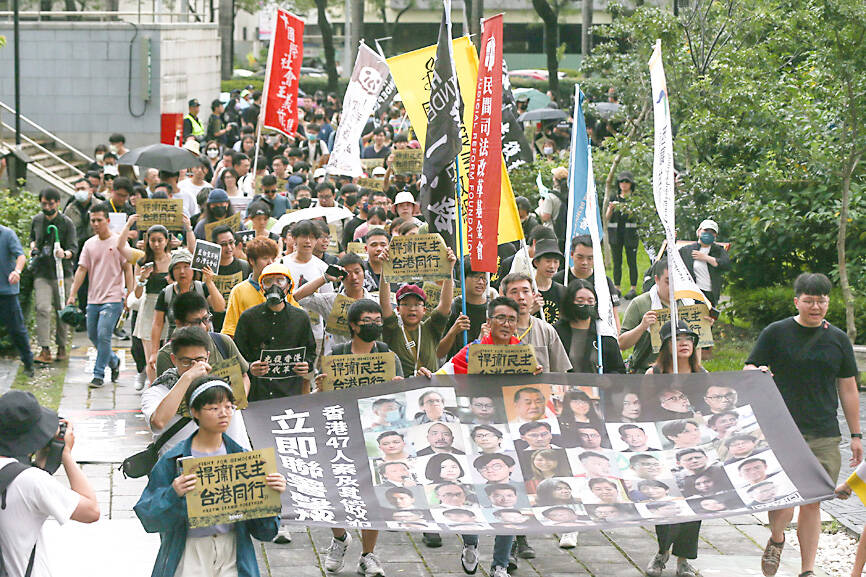Taiwan yesterday condemned China over the jailing of 45 Hong Kong activists, saying “democracy is not a crime.”
The government “strongly condemned the Chinese government’s use of judicial measures and unfair procedures to suppress the political participation and freedom of speech of Hong Kong’s pro-democracy activists,” Presidential Office spokeswoman Karen Kuo (郭雅慧) said in a statement.
International condemnation of the jailings has been swift, with the US, Australia and rights groups slamming the sentencing as evidence of the erosion of political freedoms in the territory since Beijing imposed a national security law in 2020.

Hongkongers living in Taiwan and members of local civic groups march with a banner bearing the images of 47 of Hong Kong most prominent pro-democracy figures during a rally in Taipei on June 9 to mark the fifth anniversary of the start of Hong Kong’s 2019 mass protests.
Photo: I-Hwa Cheng, AFP
Yesterday’s sentencing “not only breaks the promises of ‘50 years unchanged’ and a ‘high degree of autonomy,’ but also further proves the unworkability of ‘one country, two systems,’” Kuo said, referencing the 50-year transitionary governance model after the handover from the UK in 1997.
“The people of Taiwan and Hong Kong share a common pursuit of freedom and democracy,” she said.
The Mainland Affairs Council urged the Hong Kong government to protect its citizens’ rights, cease political oppression and release detained democracy supporters.
Multiple incidents over the past few years have dealt a blow to Hong Kong’s international ratings on democracy and human rights, the council said.
The Hong Kong government should protect its people’s rights, freedom of speech and the right to an unbiased judiciary process, it said.
The Democratic Progressive Party also condemned the rulings, saying that the full-on persecution of Hong Kong’s democracy supporters highlights the Chinese Communist Party’s (CCP) authoritarian nature.
The forced passage of Article 23 of Hong Kong’s Basic Law and the National Security Law has destroyed Hong Kong’s democracy and human rights, and exposed the sham of “one country, two systems,” it added.
The Chinese Nationalist Party (KMT) said it continues to support democracy and freedom, adding that the ruling was inconducive to rallying Hong Kongers’ support for the CCP government.
Nonviolent methods of expressing opinions are a norm of democratic society and should be a fundamental right of the people, the KMT said.
The Taiwan People’s Party (TPP) said it adamantly opposes such repressive authoritarianism and urged the CCP to answer international concerns regarding its conduct.
The TPP caucus in May urged the Mainland Affairs Council to flesh out ways for Hong Kongers to seek political asylum or pursue business immigration, it said, calling on the administration to support Hong Kong.
Hong Kong Outlanders, a Hong Kong support group in Taiwan, panned the ruling as illogical and symbolized the death of the concepts of the rule of law and an independent judiciary in Hong Kong.
The group urged the Taiwanese government to continue to support Hong Kong protesters and provide them with channels to conditionally seek asylum.
It also called on the Taiwanese government to promote and guarantee Hong Kongers’ basic rights in Taiwan, providing them a haven from cross-border threats from the CCP.
Additional reporting by Chen Yun, Lin Hsin-han and Lin Che-yuan
Source: Taipei Times - 2024/11/20




















